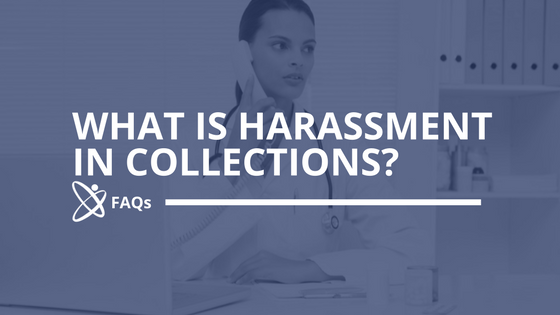
“Stop harassing me!”
Hopefully you have not had this conversation too many times in your attempt to collect a past-due balance from a patient, but chances are you or someone on your patient accounting team has heard this before.
You probably didn’t reply to a job listing “seeking a patient collections representative” when you entered the healthcare field, however if you have been tasked with collecting from patients you are being trusted with the financial success of your organization, which is critical to its ability to provide care. Therefore, understanding what you can and cannot do to secure payment for services is important not only for your success, but also for your entire organization.
The definition of harassment or abuse as it pertains to debt collection is outlined in the U.S. Code: Title 15, Chapter 41, Subchapter V, Section 1692d, which specifically states:
“A debt collector may not engage in any conduct the natural consequence of which is to harass, oppress, or abuse any person in connection with the collection of a debt.”
The statute goes on to list six examples of conduct that constitute harassment or abuse. As long as you are not engaging in any of these actions you can feel certain that you are within your rights as a creditor attempting to collect a debt under federal harassment laws. We’re breaking down the various provisions to help you better understand what you can and cannot do.
“Without limiting the general application of the foregoing, the following conduct is a violation of this section:”
“The use or threat of use of violence or other criminal means to harm the physical person, reputation, or property of any person.”
Of course, you cannot threaten a patient in order to obtain payment.
“The use of obscene or profane language or language the natural consequence of which is to abuse the hearer or reader.”
Note that this provision includes the reader. This applies not only to verbal communications but also to written, and also includes any symbols, pictures, etc. that could be considered obscene or profane.
“The publication of a list of consumers who allegedly refuse to pay debts, except to a consumer reporting agency or to persons meeting the requirements of section 1681a(f) or 1681b(3) of this title.”
At one time you could walk into any hair salon or grocery store and find bad checks hung up on the wall. Under this provision, the publication of bad debt anywhere except to a collection or reporting agency can be considered harassment or abuse.
“The advertisement for sale of any debt to coerce payment of the debt.”
The sale of bad debt is not prohibited under this statute, only the false representation or implication that the debt will be sold in order to coerce payment.
“Causing a telephone to ring or engaging any person in telephone conversation repeatedly or continuously with intent to annoy, abuse, or harass any person at the called number.”
This is often where representatives can be unsure of their rights. Contacting your patients with the intent of collecting payment for services rendered is not harassment. Communication only rises to the level of harassment or abuse if and when you call the patient repeatedly with the specific intent to annoy them. An example would be redialing the patient repeatedly with the intent to interrupt their dinner and annoy them, not to collect the debt.
“Except as provided in section 1692b of this title, the placement of telephone calls without meaningful disclosure of the caller’s identity.”
This provision requires you to identify yourself properly to the patient. Not only must you disclose who you are, but also you cannot falsely represent yourself or your organization to attempt to collect the debt or any information concerning the patient. For example, you cannot claim to be from a collection agency in an attempt to promote payment when you are not.
This statute can be read in its entirety via the U.S. Government Publishing Office here. When attempting to collect from a patient, remember that your state may have specific laws regulating what you can and cannot do. Additionally, the Fair Debt Collection Practices Act is the federal law regulating collection practices by third-party medical collectors. While agencies are generally held to a higher standard than creditors, it is advised to understand these regulations as well.
Have more questions about collecting from patients? We've got you covered. Get our Collecting from Patients eBook for a complete guide to improving recovery at every stage of the revenue cycle, plus tips for changing your mindset about asking for money and more!
Written by Ali Bechtel, Marketing Manager
This information is not intended to be legal advice and may not be used as legal advice. Legal advice must be tailored to the specific circumstances of each case. Every effort has been made to assure this information is up-to-date as of the date of publication. It is not intended to be a full and exhaustive explanation of the law in any area, nor should it be used to replace the advice of your own legal counsel.
